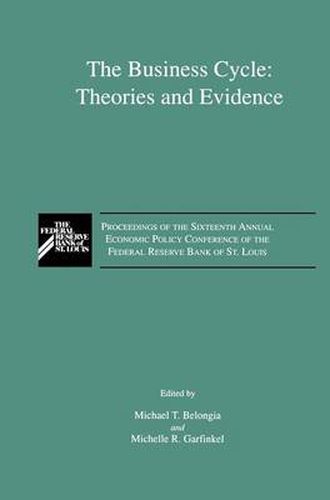Readings Newsletter
Become a Readings Member to make your shopping experience even easier.
Sign in or sign up for free!
You’re not far away from qualifying for FREE standard shipping within Australia
You’ve qualified for FREE standard shipping within Australia
The cart is loading…






This title is printed to order. This book may have been self-published. If so, we cannot guarantee the quality of the content. In the main most books will have gone through the editing process however some may not. We therefore suggest that you be aware of this before ordering this book. If in doubt check either the author or publisher’s details as we are unable to accept any returns unless they are faulty. Please contact us if you have any questions.
These proceedings, from a conference held at the Federal Reserve Bank of St. Louis on October 17-18, 1991, attempted to layout what we currently know about aggregate economic fluctuations. Identifying what we know inevitably reveals what we do not know about such fluctuations as well. From the vantage point of where the conference’s participants view our current understanding to be, these proceedings can be seen as suggesting an agenda for further research. The conference was divided into five sections. It began with the formu lation of an empirical definition of the business cycle and a recitation of the stylized facts that must be explained by any theory that purports to capture the business cycle’s essence. After outlining the historical develop ment and key features of the current theories of business cycles, the conference evaluated these theories on the basis of their ability to explain the facts. Included in this evaluation was a discussion of whether (and how) the competing theories could be distinguished empirically. The conference then examined the implications for policy of what is known and not known about business cycles. A panel discussion closed the conference, high lighting important unresolved theoretical and empirical issues that should be taken up in future business cycle research. What Is a Business Cycle? Before gaining a genuine understanding of business cycles, economists must agree and be clear about what they mean when they refer to the cycle.
$9.00 standard shipping within Australia
FREE standard shipping within Australia for orders over $100.00
Express & International shipping calculated at checkout
This title is printed to order. This book may have been self-published. If so, we cannot guarantee the quality of the content. In the main most books will have gone through the editing process however some may not. We therefore suggest that you be aware of this before ordering this book. If in doubt check either the author or publisher’s details as we are unable to accept any returns unless they are faulty. Please contact us if you have any questions.
These proceedings, from a conference held at the Federal Reserve Bank of St. Louis on October 17-18, 1991, attempted to layout what we currently know about aggregate economic fluctuations. Identifying what we know inevitably reveals what we do not know about such fluctuations as well. From the vantage point of where the conference’s participants view our current understanding to be, these proceedings can be seen as suggesting an agenda for further research. The conference was divided into five sections. It began with the formu lation of an empirical definition of the business cycle and a recitation of the stylized facts that must be explained by any theory that purports to capture the business cycle’s essence. After outlining the historical develop ment and key features of the current theories of business cycles, the conference evaluated these theories on the basis of their ability to explain the facts. Included in this evaluation was a discussion of whether (and how) the competing theories could be distinguished empirically. The conference then examined the implications for policy of what is known and not known about business cycles. A panel discussion closed the conference, high lighting important unresolved theoretical and empirical issues that should be taken up in future business cycle research. What Is a Business Cycle? Before gaining a genuine understanding of business cycles, economists must agree and be clear about what they mean when they refer to the cycle.